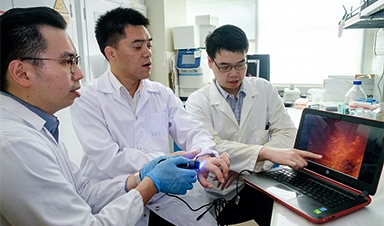Clinicians presently find it hard to predict how scars will form after surgery or after a burn wound, without using invasive testing.
The research team used new nanoparticles in animals and human skin samples to demonstrate the potential to rapidly and accurately predict whether a wound is likely to result in excessive scarring as occurs in skin contractures and keloids.
If required, doctors can then take conventional preventive steps to lessen scar formation, such as using silicon sheets to ensure a wound is flat and moist.
In developed countries alone, around 100 million patients will develop scars each year, arising from 80 million elective and trauma surgery operations. In Singapore, an estimated 400,000 people (1 in 12 people going through procedures) develop scars each year because of surgery.
Excessive scarring can greatly affect a patient’s quality of life, both psychologically and physically, as the scars can inhibit activity and movement, and can be painful when strained.
The new method was formulated by a team led by Assistant Professor Xu Chenjie from NTU’s School of Chemical and Biomedical Engineering, nanoscience expert Professor Chad A Mirkin from Northwestern University, United States, and Dr Amy S Paller, Chair of Dermatology at Northwestern University Feinberg School of Medicine.
Image Credit: NTU Singapore
News This Week
New Toothpaste Stops Gum Disease Without Harming Healthy Bacteria
Researchers have developed a targeted approach to combat periodontitis without disrupting the natural balance of the oral microbiome. The innovation could reshape how gum disease is treated while preserving beneficial bacteria. The human mouth [...]
Plastic Without End: Are We Polluting the Planet for Eternity?
The Kunming Montreal Global Biodiversity Framework calls for the elimination of plastic pollution by 2030. If that goal has been clearly set, why have meaningful measures that create real change still not been implemented? [...]
Scientists Rewire Natural Killer Cells To Attack Cancer Faster and Harder
Researchers tested new CAR designs in NK-92 cells and found the modified cells killed tumor cells more effectively, showing stronger anti-cancer activity. Researchers at the Ribeirão Preto Blood Center and the Center for Cell-Based [...]
New “Cellular” Target Could Transform How We Treat Alzheimer’s Disease
A new study from researchers highlights an unexpected player in Alzheimer’s disease: aging astrocytes. Senescent astrocytes have been identified as a major contributor to Alzheimer’s progression. The cells lose protective functions and fuel inflammation, particularly in [...]
Treating a Common Dental Infection… Effects That Extend Far Beyond the Mouth
Successful root canal treatment may help lower inflammation associated with heart disease and improve blood sugar and cholesterol levels. Treating an infected tooth with a successful root canal procedure may do more than relieve [...]
Microplastics found in prostate tumors in small study
In a new study, researchers found microplastics deep inside prostate cancer tumors, raising more questions about the role the ubiquitous pollutants play in public health. The findings — which come from a small study of 10 [...]
All blue-eyed people have this one thing in common
All Blue-Eyed People Have This One Thing In Common Blue Eyes Aren’t Random—Research Traces Them Back to One Prehistoric Human It sounds like a myth at first — something you’d hear in a folklore [...]
Scientists reveal how exercise protects the brain from Alzheimer’s
Researchers at UC San Francisco have identified a biological process that may explain why exercise sharpens thinking and memory. Their findings suggest that physical activity strengthens the brain's built in defense system, helping protect [...]














Leave A Comment